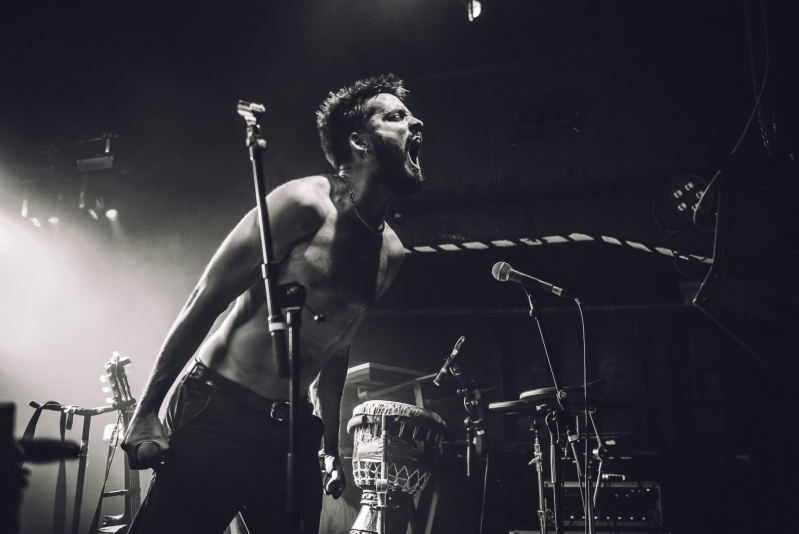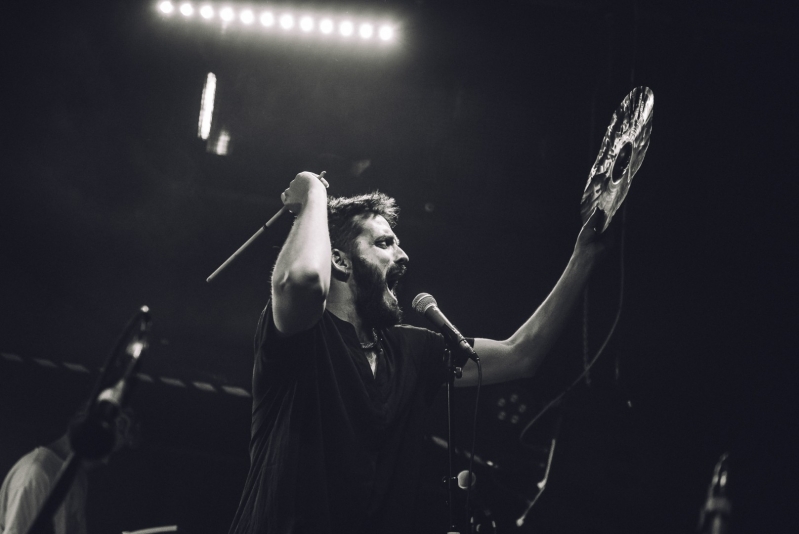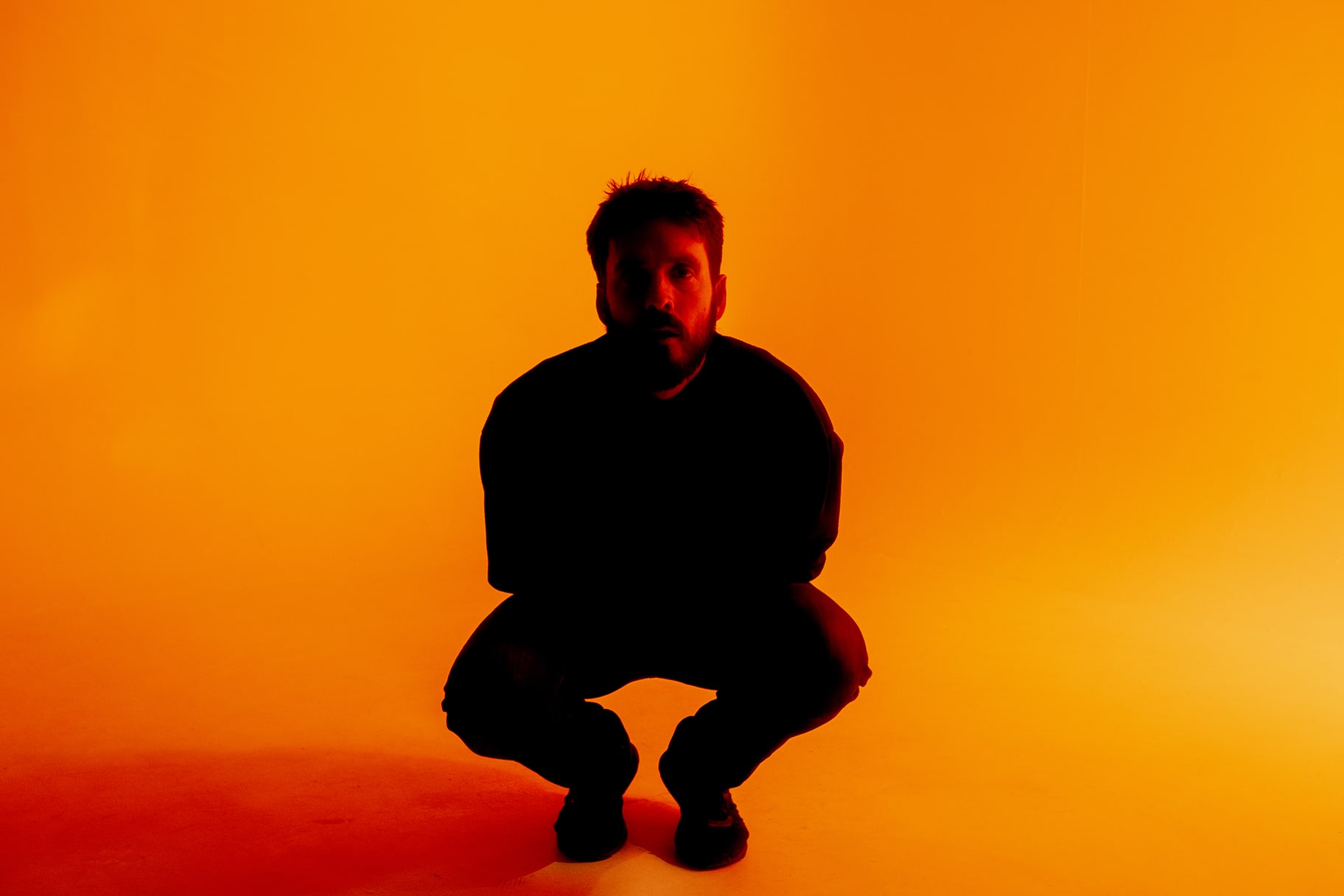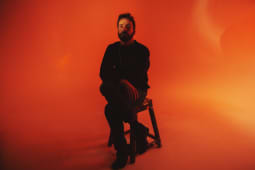Bristol-born Dizraeli (Rowan Sawday) is a musician and poet whose most recent album, The Unmaster, takes listeners on a kaleidoscopic journey through his fertile mind. Recorded and produced over two years, the album represents and reflects a shift in his thinking, away from damaging societal norms about how to be an artist and a man, to a more holistic, healthy and connected headspace. With roots in hip-hop, Dizraeli’s music work is a fusion of disparate influences, and being an established slam poet, his lyrics, ideas and delivery will bounce around your head for weeks. The first single from a remix project for The Unmaster is out now. Synth wizard Danalogue from acclaimed jazz/psychedelic trio, The Comet is Coming, takes on ‘Ketamine Honey’ – listen here. I spoke to Dizraeli back in February and we talked meditation, masculinity, music and mindfulness. His facility with language is palpable, so we thought we’d treat you to the full transcript of the conversation.
Hi Rowan – where did your love of language come from?
My love of language really came from my parents. My mum was a teacher, she did English and drama, and my dad was a language teacher, he speaks several languages and taught French and Spanish. I grew up in a house full of books and full of words. It was very much my environment from a young age and as soon as I learned to read, I devoured books – piles and piles of books. As soon as I could do it myself I didn't want my parents to read to me anymore. I wanted it to be my own; the voices I made in my head. So I'd say that my love of language started really early, as soon as language came really. My love of music came pretty early as well. As soon as I heard my first hip-hop tune, at the age of nine, I wrote a hip-hop tune.
What was it?
It was ‘Boom! Shake the Room’ by Jazzy Jeff and the Fresh Prince.
So it was pretty much love at first sight with hip-hop and language.
Yeah exactly. Plus, my dad played guitar and sang French songs in particular. My dad gave me my first guitar. There were always songs around the fire; we did a lot of camping when I was a kid, it was quite a hippy environment. My aunt and cousins, we’d all sing together basically – very much a part of our family culture. So it’s a mixture of all those.
Do you think having that grounding helped you to find your voice? Writing can be quite a vulnerable thing sometimes.
Yeah for sure man. For me, the process of reading was always intimately linked to the process of writing, and listening to music was always about making it as well. Sitting round a fire with cousins where the music was live and direct from a real human form with a guitar, it meant that it always felt to me as if it was within my reach to be the person making it as well.
The album represents quite a journey.
Yeah in many, many ways.
Just in terms of it as a creative project, how does it feel going from private to public? Is there a degree of anxiety there?
For sure yeah, yeah – the moment of releasing this album was a pretty anxious one, I won’t lie. This, more than anything I’ve ever done, feels like handing my personal diaries to strangers. I mean it’s not quite that, it’s obviously edited, filtered diary content, but nevertheless it’s super direct and raw in terms of my own personal experience. A lot of the text and the little interludes between songs where I do spoken word moments, they’re literally excerpts from my diary or from my morning free-writes that I do.
So yeah, it was an anxious moment and it’s also a relief. A lot of my journey in the last five or so years has been about authenticity and honesty, and just reducing the gap between my internal truth, even if it’s a chaotic truth, and the outside world, you know? In a way this feels a bit like the relief I felt at coming out as bisexual. There was this sense of, ‘I don’t have to pretend anymore.’ It’s just a letting-go of pretence and this album to me is about that. It feels more truthfully me than anything I’ve done before.


You mentioned coming out, and masculinity is something you’ve spoken about before. Where do you think our ideas of masculinity come from? From the way you describe your childhood it doesn’t sound like your family life was an origin.
Just everywhere, you know? I grew up in the world in the 80s and 90s – and in the West Country, which is not necessarily the most open-minded of places. I went to a state school in North Somerset and very much the model of masculinity was white dudes from North Somerset who were into cider and fighting. Not exclusively – I don’t want to paint it in black and white – and I have my closest friends who I’m still very near to now, they’re from that school and male. So it wasn’t like I was exclusively in Jockland if you know what I mean.
It’s funny because I could have come out of my context without so many hang-ups about what it was to be a boy. I think one of the reasons was because I got bullied quite badly at the school before – about my body and my perceived weakness – so I think I developed a bit of a complex there about it and did that pendulum thing of swinging right the other way to make up. Hip-hop was one way I did that and I got really good at rapping and skateboarding and DJing and all the stuff that was part of that world. It just felt like something I loved at the time but I’m sure part of it was me latching onto a sort of hyper-masculinity in order to hide the fact that I was a sensitive little flower that fancied boys. It’s an old story – there’s nothing new about that dynamic.
I suppose that’s what’s so insidious about it; it kind of creeps in without you realising.
Completely. I think one of the things that I definitely inherited as a bloke was the idea of kingship, and the idea that I had to be the lord of my domain in any given circumstance. So in conversation, as a boy I had to be the one that knew, in sport I had to be the one that could, I had to be the one that could lift the weight, kick the ball, open the jar, not cry. There was an idea of kingship, and kingship in solitude. There’s a kind of lonely kingship, this idea of being a rock and a king and an island all at once. That’s what part of the title of the The Unmaster is about; letting go of that kingship. It’s embracing the state of the student, the one who is learning, not the one who already knows. I had to do a lot of that embracing in the process of working through my mental wobbles, admitting that I was not able to cope or clamber out of this particular hole on my own – I had to seek help.
Admitting you need help can also be an anxious thing to do but cathartic in the sense that it might help move from a problem-solving intelligence, perhaps more to an emotional intelligence.
Yeah and also, problem-solving when it’s an idea that problems have to be solved in isolation isn’t really intelligence, because very few realisations have ever been arrived at, or problems sustainably solved, by one person operating alone. This idea, of the solitary genius alone in the darkness of his cave by the light of a flickering whatever, is really present in the world of song-writing and art. You go to your dungeon and you emerge with a masterpiece – it’s just bullshit. You don’t find inspiration in the darkness, you find inspiration amongst other people who are making. That’s another nice thing to let go of as an artist. It’s like, ‘Ah, I don’t have to reinvent the wheel, I don’t have to be the first ever. I can just be part of a story.’
Do you think this fallacy of the solitary genius leads to an obligation felt by artists to lead a lifestyle which is damaging to their own mental health?
Yes. You took the words right out of my mouth. I think artists have a tendency not to look after themselves because they think that by living in a position of constant extremis they’ll make shit worth hearing. I know some quite unhappy artists who make wonderful things, but I believe that I’ll make my best work if I find the joy in making. The Unmaster, it’s a dark album but it was a fucking joyful process to make. I had a lot of fun making it, and it was literally a process of finding joy again. I made it standing up. I danced through the whole process – I knew a piece was working when it made me dance. A lot of it was through the summer of 2017, which was very hot, so I was like stark naked in my room half the time with the curtains closed, just sweating and dancing with sunshine pouring through the gap.

Being so saturated with words, I wonder what you think about the language associated with mental health. Do you think it’s a help or a hindrance?
I think it varies massively, doesn’t it? People use computer metaphors to describe mental health; to say they’re overloaded or glitching or in shutdown. And they use weather metaphors – I find the weather images are more useful for me because the weather is also something that will pass, and you can respond to the weather in a way of your choosing. You can choose to hunch your shoulders against the rain, but it won't make any difference to how wet you get. Or, you can put your chin up, put your shoulders back and bloody well open your mouth and enjoy the rain on your forehead, you know? The weather of my mind has completely changed since I began my meditation practice.
Tell me about that.
I did a mindfulness course in 2016 and have been meditating using Buddhist practices ever since. I’ve been on a couple of retreats as well and I find that it allows me calm and focus to find the joy in things. It helps me stop and notice the world around me, see the richness and detail of the world and see exactly what it is I have on my doorstep in terms of experience and people around me – rather than grasping for something that isn’t here. And it's a constant process. I generally meditate every day – I find it hard to keep it going when I’m on tour but it’s very, very transformative for me. It changes the game completely – in terms of my day to day experience, in terms of my creative process; even talking about it I’m feeling calmer.
You make great use of found sounds and field recordings – what are some of your favourites, and did meditation and mindfulness help you notice them more?
One of my favourite sounds because of how surprising it is, is a pitched-down songbird in my parents' garden in Bristol – you won’t guess what sound on what track it is – it is fucking mental. I love the idea that that’s how birds hear birds. The idea that birds live at a higher speed than us and therefore hear at a lower pitch, or rather, their range of song is in a much higher register than ours. I have no idea if it’s true, I’m just making up science – my fantasy is that the sound on the album is how birds hear birds.
And yes definitely, since I began to meditate I noticed sound a lot more. This is mutually nourishing as well, because the more I’m recording, the more sounds I hear as I pass them, which helps me live more mindfully as well.
Tell us about the remix project.
I have an album of remixes and versions of The Unmaster dropping in September and the first track is a remix by Danalogue from The Comet is Coming and it’s just fucking monstrously great. I’m very excited about it.
Did he work on the original as well?
Yeah he played synths on a couple of tracks, but this is actually his writing and his creation. This is him letting rip and he’s the most incredible – I don’t know if you know The Comet is Coming, but he’s the most fucking phenomenal player.
It must be really nice to have a second life for something you’ve made as well.
Yeah it’s lovely and I’m so excited about the remix project. I’ve got Danalogue, DJ Simbad, Spoek Mathambo from South Africa – a really broad range of excellent producers that I love. It’s going to give it a whole new lease of life.
What can we expect from a Dizraeli show?
People can expect catharsis and release and joy and yelling and sweating, getting down and dirty and dancing, and moments of tenderness. The thing that I feel about this show is that it’s... I think it’s profoundly human and I hope that it doesn’t take itself too seriously.
The Unmaster is out now. The tour is postponed for the time being, see his website for updates.
B&W photography © Giulia Spadafora / Soul Media
Header and side images by Fabrice Bourgelle










